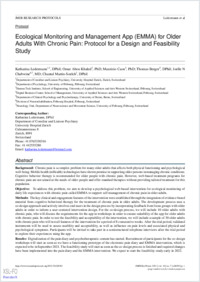Ecological Monitoring and Management App (EMMA) for Older Adults With Chronic Pain: Protocol for a Design and Feasibility Study
- Ledermann, Katharina Department of Psychology, University of Fribourg, Switzerland
- Abou Khaled, Omar HumanTech Institute, School of Engineering, University of Applied Sciences and Arts Western Switzerland (HES-SO
- Caon, Maurizio Digital Business Center, School of Management, University of Applied Sciences and Arts Western Switzerland (HES-SO)
- Berger, Thomas Department of Clinical Psychology and Psychotherapy, University of Berne, Switzerland
- Chabwine, Joelle N. Division of Neurorehabilitation, Fribourg Hospital (Site Meyriez) and Neurology Unit, Department of Neuroscience and Movement Science, Medicine Section, University of Fribourg, Switzerland
- Martin Sölch, Chantal Department of Psychology, University of Fribourg, Switzerland
-
2021
English
Background: Chronic pain is a complex problem for many older adults that affects both physical functioning and psychological well-being. Mobile health (mHealth) technologies have shown promise in supporting older persons in managing chronic conditions. Cognitive behavior therapy (CBT) is recommended for older people with chronic pain. However, online treatment programs for chronic pain are not aimed at the needs of older people and offer standard therapies without providing tailored treatment for this population. To address this problem, we will develop a psychological internet-based intervention based on ecological monitoring of daily life experiences with chronic pain, called EMMA to support self-management of chronic pain in older adults. Method: The key clinical and engagement features of the intervention were established through the integration of evidence-based material from cognitive behavioral therapy for the treatment of chronic pain in older adults. The development process uses a CoDesign approach and actively involves the end- users in the design process by incorporating feedback from focus groups with older adults in order to inform a user centered intervention design. For the CoDesign process, we will include 10 older adults with chronic pain that will discuss the requirements in workshops in order to ensure suitability for older adults with chronic pain. In order to test the feasibility and acceptability of the intervention, we will include a sample of 30 older adults with chronic pain that will test all features of the intervention for a period of eight consecutive weeks. After the trial period, validated instruments to assess usability and acceptability, as well as influence on pain levels and associated physical and psychological symptoms will be filled out by the participants. Participants will be invited to take part in a semi-structured telephone interview after the trial period to explore their experiences using the app. Results: Required changes to assure usability and acceptability will afterwards directly implemented in the application. The digitalization of the pain diary and psychotherapeutic content has started. Recruitment of participants for the co-design workshops will start as soon as we have a functioning prototype of the electronic pain diary and EMMA intervention which is to be expected in September 2021. The feasibility study will start as soon as the co-design process is finished and all required changes implemented into the pain diary and the EMMA intervention. We expect to start the feasibility study at the beginning of 2022.
- Faculty
- Faculté des lettres et des sciences humaines, Faculté des sciences et de médecine
- Department
- Département de Psychologie, Médecine 3ème année
- Language
-
- English
- Classification
- Psychology
- License
-
License undefined
- Identifiers
-
- RERO DOC 330646
- DOI 10.2196/26930
- Persistent URL
- https://folia.unifr.ch/unifr/documents/309512
Statistics
Document views: 202
File downloads:
- Texte intégral: 163
